In Traditional Chinese Medicine Tongue Diagnosis, the common symptoms and signs of Qi deficiency constitution are often linked to individuals who frequently feel low in energy and easily fatigued. This is generally associated with Qi deficiency in the body. Qi deficiency constitution refers to a state of physical condition caused by insufficient vital energy, weak breath, and other related issues. In TCM tongue diagnosis, individuals with Qi deficiency typically exhibit characteristics such as a pale tongue body and thin white coating.
Table of Contents
一. Main Symptoms of Qi Deficiency Constitution
Qi deficiency constitution is often caused by factors such as congenital weakness, irregular diet, emotional imbalance, chronic illness, and aging. The main symptoms include pale complexion, general fatigue, and easy exhaustion. The body type may be either overweight or underweight, and these individuals usually dislike physical exercise. Other common symptoms include shortness of breath, sweating with minimal exertion, and overall weakness.
二. Qi Deficiency Constitution: How to Improve and Adjust Through Tongue Diagnosis
Qi deficiency constitution is primarily characterized by insufficient vital energy. Therefore, when adjusting this constitution, the focus should be on replenishing Qi. This can be achieved through a combination of diet, herbal medicine, meridian treatments, and acupressure to improve the symptoms of Qi deficiency. TCM tongue diagnosis helps identify the specific manifestations of Qi deficiency, leading to the selection of the appropriate treatment methods.
1. Dietary Adjustment: Eat Warming and Qi-Boosting Foods
For individuals with Qi deficiency, dietary adjustment is essential. It is recommended to consume foods that are warm in nature and help nourish Qi and blood, such as chicken, beef, eel, soybeans, white lentils, yam, jujubes, chestnuts, cherries, and grapes. Additionally, medicinal porridges like Astragalus yam porridge, eight-treasure porridge, and beef porridge are great choices to replenish Qi.
Eight-treasure porridge can warm and nourish.
2. Herbal Treatment: Boost Qi and Strengthen Vitality
Herbal remedies are another effective method for improving Qi deficiency constitution. It is advised to use Qi-tonifying herbs such as ginseng, astragalus, and white atractylodes. These herbs can help nourish spleen and lung Qi, alleviating symptoms of Qi deficiency. These herbs can be made into medicinal dishes or brewed as tea, with options like Ginseng Angelica tea and the Four Gentlemen Decoction being excellent choices.
Herbal tea as a substitute for regular tea.
3. Exercise Adjustment: Light Exercise to Increase Vital Energy
Those with Qi deficiency should avoid strenuous physical activity and instead engage in light exercises, such as jogging, walking, or yoga. These exercises help to strengthen lung and heart function, while also restoring vitality through meditation and breathwork. They promote smooth Qi and blood circulation, balance yin and yang, and coordinate the organs to regulate Qi.
Yoga can enhance heart and lung function.
4. Acupressure Therapy: Massage Acupoints to Strengthen the Body
Individuals with Qi deficiency can enhance their physical strength and improve Qi and blood circulation by using acupressure and moxibustion. Recommended acupoints include the Zhongwan point, Qihai point, and Zusanli point to replenish vital energy. The Feishu, Pishu, and Shenmen acupoints are used to regulate the spleen, lung, and kidney functions. Each acupoint should be massaged for 3-15 minutes.
Massage Shenmen point, and moxibustion on Shenmen.
5. Health Maintenance Tips: Avoid Staying Up Late
Qi deficiency individuals are more prone to fatigue and have weaker immunity, so they should avoid staying up late. Prolonged late nights can disrupt the recovery of internal organs, lower immune function, and lead to problems like colds, digestive issues, and exacerbated Qi deficiency symptoms, such as fatigue, memory loss, and sluggish reflexes during the day.
Late nights can worsen symptoms.
三. Daily Life Adjustments: Understand Your Constitution Through Tongue Diagnosis and Adjust Lifestyle Habits to Restore Vital Energy
Daily life adjustments are crucial for individuals with Qi deficiency constitution. A suitable lifestyle and attention to important habits can help restore Qi deficiency, boost immunity, and promote overall health. Tongue diagnosis in Traditional Chinese Medicine (TCM) can help understand an individual’s physical constitution, enabling the development of a personalized treatment plan.
1. Dietary Restrictions: Avoid Spicy, Greasy, and Cold Foods
For individuals with Qi deficiency, special care must be taken with food choices. It is important to avoid consuming spicy, greasy, cold, and Qi-depleting foods. Examples include chili, fatty meats, watermelon, bitter melon, and chilled foods. These foods can harm the spleen and stomach, impair Qi and blood production, and exacerbate Qi deficiency symptoms.
2. Emotional Regulation: Maintain a Cheerful Disposition
Emotional regulation is also vital for managing Qi deficiency. Long-term fatigue or excessive worry can worsen Qi deficiency by affecting the spleen, stomach, and Qi circulation. It is recommended that individuals with Qi deficiency engage in activities such as listening to music, traveling, or exercising to reduce stress and relax the mind. Maintaining a positive mood will help promote overall health and restore vitality.
3. Seasonal Health Practices: Adapt to Seasonal Changes and Adjust the Body
Adapting to the seasons is an essential part of nurturing Qi deficiency. Different seasons require different health practices, with special attention to temperature fluctuations. During the spring and autumn, when temperature differences between day and night are significant, individuals with Qi deficiency should take extra care to stay warm and protect themselves from the cold. In summer, refreshing drinks like sour plum soup and American ginseng tea can help clear heat and boost Qi. In winter, protecting against the cold wind is crucial, and warming foods such as lamb or old hen can be consumed to nourish Qi and blood, enhancing vitality.
四. Tongue Diagnosis of Qi Deficiency Constitution: A Detailed Analysis of the Big, Pale, Stagnant Tongue and the Relationship Between Blood Stasis and Qi Deficiency
Qi deficiency often comes with some typical tongue changes, and through Traditional Chinese Medicine (TCM) tongue diagnosis, the body’s constitution can be understood with precision. The big, pale, stagnant tongue is a classic tongue sign of both Qi deficiency and blood stasis, revealing the close relationship between Qi deficiency and blood stasis.
1. Big, Pale, Stagnant Tongue — Manifestation of Qi Deficiency and Blood Stasis
The tongue is pale and enlarged, with a thin coating. The front half of the tongue often shows noticeable stagnation points or spots. This tongue manifestation indicates a deficiency of Qi and blood in the spleen and stomach, leading to impaired circulation of Qi and blood, resulting in blood stagnation. The swollen tongue body and pale tongue color reflect weak Qi and blood, which cannot circulate smoothly. Over time, this stagnation develops.
Other Pathological Tongue Symptoms
Patients with this tongue sign often show common symptoms such as fatigue, easy exhaustion, sensitivity to cold, bloating, lack of appetite, and discomfort in the abdomen due to weak Qi and blood. The body’s weak ability to transport and transform may lead to abdominal discomfort. Additionally, patients may experience persistent pain in a specific area.
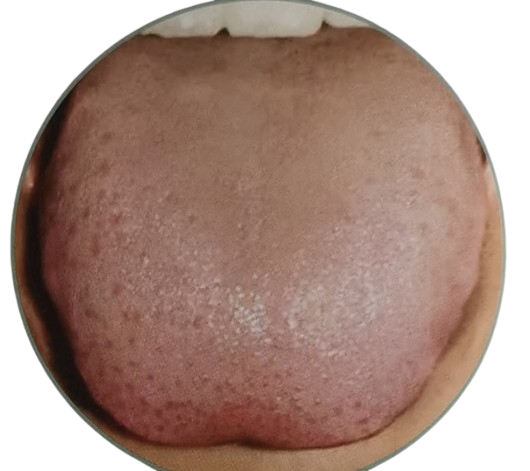
(Image) Big, Pale Tongue with Stagnation Spots
How to Adjust Qi Deficiency and Blood Stasis Symptoms Associated with a Big, Pale, Stagnant Tongue?
The fundamental cause of this tongue sign is weak Qi and blood, so treatment should focus on tonifying Qi, eliminating blood stasis, and promoting smooth circulation.
Drink Ripe Tea or Semi-Ripe Tea to Aid in Adjustment
1.1. Daily Care: Proper Diet and Sufficient Sleep
- Avoid consuming cold, greasy foods that may burden the spleen and stomach.
- Drink ripe teas such as Pu’er tea or semi-ripe teas, which are mild and help tonify Qi and blood. Avoid drinking too much green tea, as its cooling properties may worsen the condition.
- Ensure sufficient sleep, aiming for 8-10 hours per night to promote Qi and blood recovery.
Er Shen Tea — Tonifies Qi, Activates Blood, and Eliminates Stasis
1.2. Dietary Remedies: Er Shen Tea to Tonify Qi and Activate Blood
- Dietary remedy: Take 15g each of Mingdangshen (Codonopsis) and Danshen (Salvia), grind them into a fine powder. Each time, take 3g and infuse with boiling water. Er Shen Tea has the functions of tonifying Qi, activating blood, and eliminating blood stasis. It is suitable for improving the symptoms of Qi deficiency and blood stasis.
Huang Qi Tonifies Qi and Adjusts Qi Deficiency
1.3. Chinese Herbal Remedies: Tonify Qi, Eliminate Stasis, and Activate Blood
- Chinese herbal remedy: Huang Qi (Astragalus) is the main herb to tonify Qi and improve Qi deficiency symptoms. Since Qi deficiency is the primary issue, combining herbs such as Danshen, Chuanxiong, Dang Gui, and Jixueteng will help nourish and activate blood, resolve blood stasis, and promote circulation.
%20acupuncture%20point.png)
(Image) Qihai – CV6 . Acupuncture Point — Moxibustion Helps Restore Qi and Blood
1.4. Acupuncture and Moxibustion Therapy: Moxibustion and Acupuncture to Regulate Qi Deficiency and Blood Stasis
- Moxibustion at the Qihai, Guanyuan, or Shen Shu points can help restore vital energy and adjust Qi and blood. For localized pain, acupuncture can further relieve discomfort.
- Moxibustion can also be applied to the Xuehai and Sanyinjiao points to enhance Qi and blood circulation, improving blood stasis symptoms.
2. Dark Red Tongue, Thin Greasy Coating — TCM Diagnosis and Treatment for Deficiency of Vital Qi
Through Traditional Chinese Medicine (TCM) tongue diagnosis, the changes in the tongue reflect the body’s health status. The combination of a dark red tongue and thin greasy coating often indicates a deficiency of vital Qi and impaired functioning of the middle burner (spleen and stomach). This tongue sign is closely related to insufficient Qi and blood, as well as the accumulation of dampness in the body.
Tongue Diagnosis Analysis: Dark Red Tongue and Thin Greasy Coating
- Dark Red Tongue: A dark red tongue color reflects a deficiency of vital Qi and heart blood, usually indicating insufficient supply of Qi and blood, which inhibits the body’s internal transformation and movement functions.
- Thin Greasy Coating: The thin greasy coating on the tongue indicates a disorder in water and fluid metabolism. The body cannot expel dampness properly, leading to its accumulation. This is often caused by weak transformation in the middle burner, particularly in the spleen and stomach.
Other Symptoms Associated with Pathological Tongue Signs
Patients with deficiency of vital Qi and internal dampness often experience the following symptoms:
- General fatigue and easy exhaustion.
- Memory loss and unclear thinking.
- Poor appetite and lack of desire to eat.
- Abnormal bowel movements, such as constipation or diarrhea.
- Digestive discomfort, including bloating and fullness in the abdomen.
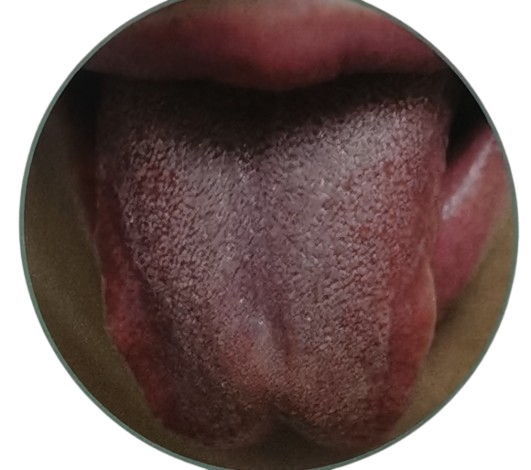
(Image) Typical Signs of a Dark Red Tongue with Thin Greasy Coating
How to Adjust?
To treat the deficiency of vital Qi and impaired transformation of the middle burner, the focus is on strengthening the spleen, tonifying Qi, nourishing blood, and improving spleen and stomach function to restore the flow of vital Qi and blood.
Eat Foods that Strengthen the Spleen and Tonify Qi to Improve Constitution
2.1. Daily Care: Dietary Adjustment
- Food Choices: For those with Qi deficiency, it is important to eat foods that tonify the spleen and promote Qi, such as spinach, tomatoes, and celery. These foods are gentle and support the digestive system. Avoid cold, spicy, or overly hot foods that may damage the spleen and stomach and worsen Qi and blood deficiency.
- Foods to Avoid: Avoid raw, cold, bitter, spicy, hot, or extreme-temperature foods, such as chili peppers, frozen foods, and greasy foods. These foods can damage the spleen and stomach Qi, impair digestion, and cause dampness accumulation.
Chinese Herbal Remedies for Strengthening the Spleen and Tonifying Qi
2.2. Herbal Formula: Strengthen the Spleen, Tonify Qi, Nourish Blood
- Herbal Recommendations: Herbs like Huang Qi (Astragalus), Dang Gui (Angelica), Shan Yao (Chinese Yam), and Tai Zi Shen (Pseudostellaria) can strengthen the spleen, tonify Qi, and nourish blood. These herbs help restore the vital Qi and improve spleen and stomach function.
- Dampness Treatment: To resolve dampness, herbs like Ze Xie (Alisma) and Fu Ling (Poria) are recommended. These herbs help clear dampness from the body, promote fluid metabolism, and resolve the accumulation of internal dampness.
Moxibustion on Zusanli Point to Strengthen the Spleen and Stomach
2.3. Acupuncture and Moxibustion: Stimulate Acupoints for Qi Deficiency and Dampness
- Recommended Acupoints: Moxibustion at acupoints like Zusanli (ST36), Zhongwan (CV12), and Guanyuan (CV4) can help strengthen the spleen and stomach, adjust Qi and blood, and enhance digestive function. Moxibustion can warm the Yang, tonify Qi, and improve the spleen and stomach functions, helping restore normal transformation and metabolism in the body.
- Daily Exercise: In addition to acupuncture and moxibustion, moderate exercise, relaxation, and outdoor activities also help improve immunity and the circulation of Qi and blood.
Heat Compress Therapy to Promote Blood Circulation
2.4. Heat Compress: Promote Circulation and Relieve Dampness
- Heat Compress Materials: Use coarse salt, cinnamon, and scallions to create a heat compress. This helps relieve discomfort in the lower back or the spleen and stomach area, promoting Qi and blood circulation.
- Heat Compress Method: Heat 500-1000g of coarse salt along with cinnamon and scallions in a pan or microwave. Once heated, place the mixture in a cloth bag and apply to the lower back or sacral area for 15-20 minutes. Heat compresses help warm the spleen and stomach, relieve muscle tension, activate blood circulation, and clear dampness.
3. Fatty, Tender Mirror Tongue — TCM Diagnosis and Treatment for Spleen Qi and Yin Deficiency
The fatty, tender mirror tongue is a typical tongue sign in Traditional Chinese Medicine (TCM), characterized by a reddish tongue color, tender and smooth tongue body, enlarged tongue, and absence of coating. This tongue sign indicates both Spleen Qi deficiency and Yin deficiency, often with a tendency toward internal deficiency heat.
Tongue Diagnosis Analysis: Fatty, Tender Mirror Tongue
- Reddish Tongue: The reddish hue indicates the presence of deficiency heat in the body. However, since the tongue is tender and smooth, this heat is considered false or empty heat, not a strong or full heat.
- Tender, Smooth Tongue: This indicates severe loss of Yin fluids, which leads to 虚火 (deficiency fire), a condition where internal heat rises due to insufficient cooling Yin.
- Fatty, Enlarged Tongue: The enlarged tongue reflects a deficiency of Spleen Qi, where the Spleen’s inability to transform and transport fluids causes a swollen, bloated tongue.
This tongue sign suggests a deficiency in both Spleen Qi and Yin fluids, resulting in sluggish circulation of Qi and blood, as well as insufficient nourishment in the body.
Other Symptoms Associated with This Tongue Sign
Patients with this tongue appearance typically exhibit the following symptoms:
- Fatigue and Weakness: The patient feels easily tired and weak, often feeling worse after physical exertion.
- Shortness of Breath: Even mild activity may lead to breathing difficulties.
- Mental Fatigue and Anxiety: There is often a lack of vitality, with the individual feeling mentally sluggish or anxious.
- Digestive Issues: Symptoms like poor appetite, bloating, indigestion, and abdominal discomfort are common.
- Mental and Emotional Disturbances: Severe cases may lead to psychological conditions such as anxiety, depression, or other emotional disturbances.
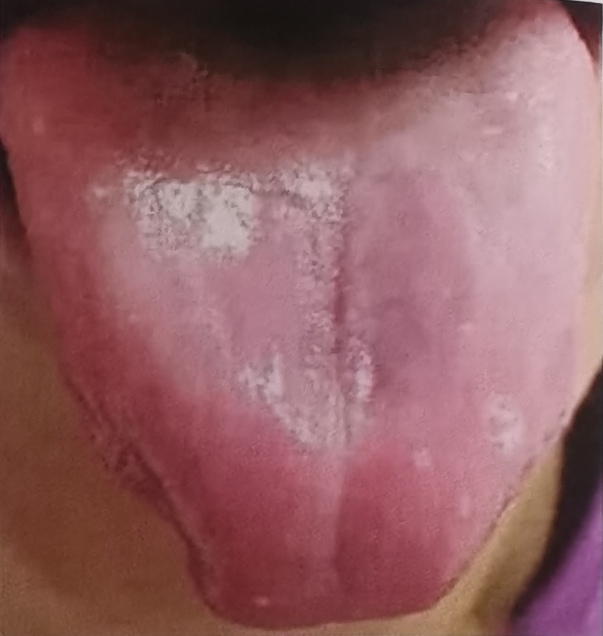
(Image) Typical Symptoms of Fatty, Tender Mirror Tongue
How to Adjust?
For patients with Spleen Qi and Yin deficiency, the focus should be on tonifying the Spleen, nourishing Yin, and benefiting Qi to improve digestion, absorption, and overall energy. The treatment approach should include dietary adjustments, herbal remedies, and acupuncture to help restore balance.
3.1. Daily Care: Dietary Adjustment
- Protein-Rich Foods: It is essential for patients to consume foods high in quality protein, such as lean meats, legumes, and dairy, to strengthen Qi and replenish Yin.
- Avoid Spicy and Stimulating Foods: Foods that harm the Spleen, such as mustard greens, radishes, soybeans, cauliflower, oil-rich foods, and walnuts, should be avoided. Spicy foods should also be limited, as they can exacerbate internal heat and hinder the recovery process.
- Maintain Regular Sleep Patterns: Patients with Spleen Qi deficiency must prioritize a consistent sleep routine. Adequate sleep (7-8 hours per night) is crucial for restoring energy and supporting digestion. Avoid staying up late, which can further deplete Yin.
Protein-Rich Foods to Help Rebuild Spleen Qi
3.2. Herbal Formulas: Strengthen the Spleen, Nourish Yin, Benefit Qi
Commonly used herbal formulas to treat this condition include:
- Goji Berries (枸杞子), Rehmannia (生地黄), Tai Zi Shen (太子参), Astragalus (黄芪), Huai Shan Yao (淮山药), and Bai Bian Dou (白扁豆). These herbs work to tonify the Spleen, nourish Yin, and boost Qi.
- Liu Wei Di Huang Wan (六味地黄丸): This formula is excellent for nourishing Yin and tonifying the Kidneys, thus balancing the Yin-Yang relationship between the Spleen and Kidneys.
- Shen Ling Bai Zhu San (参苓白术丸): Known for its ability to strengthen the Spleen, benefit Qi, and enhance digestion, this formula is especially suitable for those with weak digestive systems.
These herbal formulas should be adjusted to the individual’s condition to help replenish both Spleen Qi and Yin fluids.
Chinese Herbal Remedies to Tonify Spleen Qi and Nourish Yin
3.3. Acupuncture Therapy: Stimulate Key Acupoints
- Recommended Acupoints: Acupuncture or acupressure can be used on key acupoints such as Gan Shu (肝俞), Pi Shu (脾俞), Shen Shu (肾俞), Tai Xi (太溪), San Yin Jiao (三阴交), and Zu San Li (足三里). These acupoints help strengthen the Spleen, tonify Qi, nourish Yin, and promote better circulation of energy throughout the body.
- Massage Method: Each acupoint should be massaged gently for about 3 minutes, applying moderate pressure without overexertion. Moxibustion can also be performed at these points to warm the Yang, benefit Qi, and regulate the Spleen and Stomach.
- Acupoint Treatment Effect: By stimulating these acupoints, Qi and blood circulation are enhanced, and the balance of Yin and Yang is restored, which helps to rejuvenate both physical and mental health.
Massage on Pi Shu Acupoint to Strengthen Spleen Qi
By integrating these practices, individuals with a fatty, tender mirror tongue can gradually restore their Spleen Qi and Yin, improve digestion, and boost overall vitality.
4. Dull Tongue — TCM Diagnosis and Treatment for Qi and Yin Deficiency
The dull tongue is a common tongue manifestation in Traditional Chinese Medicine (TCM), characterized by a dull, pale tongue with a moderate tongue body, a red tip, a thin white coating, and sometimes slight purple spots. This tongue appearance typically suggests a condition of Qi and Blood deficiency, often reflecting a prolonged or complex illness.
Tongue Diagnosis Analysis: Dull Tongue
- Dull, Pale Tongue: This indicates long-term Qi and Blood deficiency, leading to an imbalance in the body’s Yin and Yang, causing difficulty in the smooth flow of Qi and Blood.
- Moderate Tongue Body, Red Tip: This suggests the simultaneous presence of Qi deficiency and Yin deficiency, with deficiency heat rising, commonly accompanied by heart blood deficiency.
- Thin White Coating: The thin coating shows that the internal dampness is light, and digestive function is still functional, but due to insufficient Qi and Yin, the body is unable to effectively resolve this dampness.
- Slight Purple Spots: These spots reflect poor circulation of Qi and Blood, with stagnation and minor blood retention.
This tongue appearance signals Qi and Blood deficiency, requiring interventions aimed at restoring balance in both.
Other Symptoms Associated with This Tongue Sign
Patients exhibiting a dull tongue generally experience the following symptoms:
- Weak Limbs and Fatigue: The patient feels fatigued easily, with shortness of breath even after minor exertion.
- Mental Fatigue and Poor Concentration: The person may feel mentally sluggish, tired, and struggle with focusing or maintaining attention.
- Dizziness and Lightheadedness: This may be accompanied by spontaneous sweating (especially during rest or fatigue), a sign of combined Qi deficiency and Yin deficiency.
- Excessive Sweating: Patients may sweat profusely during periods of fatigue, reflecting a complex state of Yin and Qi deficiencies.
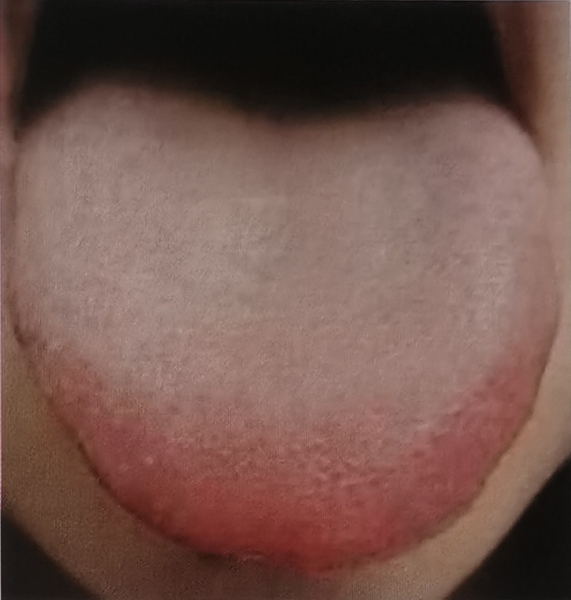
(Image) Typical Symptoms of Dull Tongue: Thin White Coating and Red Tip
How to Adjust?
For patients with Qi and Yin deficiency, the primary treatment goals are to tonify Qi, nourish Blood, and promote circulation, while also addressing stagnant blood. The approach should include dietary changes, herbal remedies, and acupuncture to restore the flow of Qi and Blood and address the underlying deficiencies.
4.1. Daily Care: Dietary Adjustments
- Qi and Blood Tonifying Foods: Patients should consume foods that tonify Qi and Blood, such as peanuts, black fungus (木耳), dates, chicken, and lamb. These foods help enhance vitality, strengthen the immune system, and increase energy levels.
- Avoid Smoked and Pickled Foods: These types of food are often high in salt, which can damage the Spleen and Stomach, hindering Qi and Blood production. Patients should try to avoid them.
- Control Sugar and Salt Intake: Excessive sugar and salt can contribute to damp stagnation, impairing the function of the Spleen and leading to poor digestion. It’s important to consume these in moderation.
Peanuts: A Food That Tonifies Qi and Blood to Enhance Vitality
4.2. Herbal Formulas: Tonify the Qi and Activate Blood
Commonly used herbal formulas for treating Qi and Blood deficiency include:
- Huang Qi (炙黄芪), Tai Zi Shen (太子参), Zhu Ling (猪苓), Fu Ling (茯苓), Chi Shao (赤芍), Gan Di Huang (干地黄), Dang Gui (当归), Dan Shen (丹参), Ejiao (阿胶), and Chao Bai Zhu (炒白术). These herbs help tonify Qi, nourish Blood, and promote blood circulation.
- Ba Zhen Wan (八珍丸): This formula is particularly useful for patients with both Qi and Blood deficiency. It enhances the Qi and Blood functions and helps with digestion.
- Jian Pi Yi Qi Granules (健脾益气颗粒): This helps those with Spleen Qi deficiency increase Qi and Blood production, thereby improving digestion and absorption.
These herbal formulas should be adjusted according to individual needs to boost Qi, Blood, and circulation.
Tai Zi Shen: Tonifying Spleen Qi and Nourishing Blood
4.3. Acupuncture Therapy: Tonify Qi and Nourish Blood
- Recommended Acupoints: Acupuncture or acupressure can be applied to key points such as San Yin Jiao (三阴交), Kun Lun (昆仑), and Zu San Li (足三里). These acupoints help tonify Qi, nourish Blood, and improve circulation of energy throughout the body.
- Moxibustion Method: For each acupoint, moxibustion should be applied for 15-20 minutes with moderate intensity to promote Qi and Blood circulation and increase overall energy and immunity.
- Effects of Treatment: Stimulating these acupoints can significantly improve Qi and Blood deficiency, alleviating fatigue, dizziness, and other related symptoms, and help patients recover their strength and vitality.
San Yin Jiao Acupoint for Tonifying Qi and Nourishing Blood via Moxibustion
By incorporating these treatments, individuals with a dull tongue can gradually restore Qi and Blood, enhance circulation, and recover both physically and mentally.
5. Fatty, Pale Tongue with White Coating — TCM Diagnosis and Treatment for Spleen and Lung Qi Deficiency
A fatty, pale tongue with white coating is a common tongue presentation in Traditional Chinese Medicine (TCM), typically indicating Spleen and Lung Qi deficiency. This condition suggests Middle Jiao deficiency, with impaired Qi and digestive functions. The tongue manifestation includes a pale color, tender texture, white coating, and sometimes slight indentations on the sides of the tongue, which reflect weakened Spleen and Lung Qi.
Tongue Diagnosis Analysis: Fatty, Pale Tongue with White Coating
- Pale Tongue, Tender Texture: This reflects Spleen and Lung Qi deficiency, leading to insufficient Qi and Blood production and weakened digestive function.
- White Coating: Indicates cold and dampness in the body due to impaired Spleen and Stomach function, preventing proper digestion and fluid excretion.
- Slightly Enlarged Tongue with Teeth Marks: Suggests Spleen Qi deficiency and difficulty in fluid metabolism, leading to damp retention and phlegm accumulation.
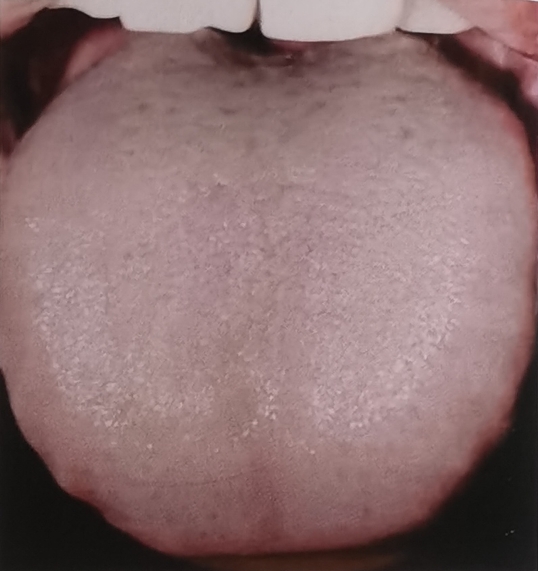
(Image) Typical Symptoms of Fatty, Pale Tongue with White Coating
Other Symptoms Associated with This Tongue Sign
Patients with this tongue presentation often experience the following symptoms:
- Fatigue and Weakness: These patients often feel exhausted and have difficulty recovering their energy, even after a full day of rest.
- Shortness of Breath and Low Speech Volume: There is often a noticeable lack of energy, and the person may speak softly and feel weak.
- Dizziness and Headaches: These symptoms are often a result of Qi deficiency, which leads to insufficient circulation of blood and energy to the head.
- Spontaneous Sweating: Excessive sweating, especially during physical activity, reflects an inability to regulate body temperature due to Qi deficiency.
- Constipation, Cold Extremities, and Sensitivity to Cold: These symptoms occur due to the Spleen’s inability to transform and transport fluids, leading to poor digestion and fluid retention.
How to Adjust?
The root cause of fatty, pale tongue with white coating is Spleen and Lung Qi deficiency. Treatment should focus on tonifying Qi, strengthening the Spleen, and promoting digestion. This will help restore balance to the body’s Qi and Blood, alleviate dampness, and improve overall energy levels.
5.1. Daily Care: Dietary Adjustments
- Increase Fiber Intake: Eat more coarse grains and whole foods such as oats, sweet potatoes, and black rice to help strengthen the Spleen and improve digestion.
- Adequate Fluid Intake: Drink approximately 2000 mL of water daily to support metabolism, digestion, and hydration.
- Avoid Alcohol, Smoking, and Excessive Tea/Coffee: These substances can irritate the Spleen and Stomach, leading to Qi stagnation and digestive issues. It’s best to avoid or limit these.
- Moderate Exercise: Regular physical activity can help improve stamina and support the restoration of Spleen and Lung Qi.
Coarse Grains and Whole Foods Support Qi and Spleen Health
5.2. Herbal Formulas: Tonify Qi and Strengthen the Spleen
Commonly used herbal formulas for Spleen and Lung Qi deficiency include:
- Ren Shen (人参), Huang Qi (黄芪), Bai Zhu (白术), Zhi Gan Cao (炙甘草), Dang Gui (当归), Chen Pi (陈皮), Sheng Ma (升麻), Chai Hu (柴胡), and Huo Ma Ren (火麻仁). These herbs can help tonify Qi, strengthen the Spleen, and improve digestion.
- Bu Zhong Yi Qi Wan (补中益气丸): A well-known formula used for Spleen Qi deficiency, especially in patients who experience shortness of breath, fatigue, and digestive weakness.
Huang Qi and Bai Zhu Herbs to Tonify Qi and Strengthen the Spleen
5.3. Acupuncture Therapy: Tonify Qi and Strengthen the Spleen
- Recommended Acupoints: For patients with Spleen and Lung Qi deficiency, acupuncture or acupressure at key points such as Bai Hui (百会), Qi Hai (气海), Da Chang Shu (大肠俞), Guan Yuan (关元), and Zu San Li (足三里) can be particularly beneficial. These points are effective for boosting Qi, strengthening digestion, and promoting overall energy circulation.
- Massage Method: Gentle clockwise massage at these acupoints can help enhance the flow of Qi and Blood and relieve symptoms of Qi deficiency.
- Moxibustion: Applying moxibustion to the selected acupoints for 15-20 minutes can further help to warm the Spleen, tonify Qi, and improve energy levels and digestion.
Bai Hui Acupoint with Moxibustion for Tonifying Qi and Promoting Circulation
By incorporating these treatments, patients with fatty, pale tongue with white coating can restore the Spleen and Lung Qi, alleviate dampness, improve digestion, and recover energy and vitality.
6. Teeth Marks, Fatty, Pale Tongue with White Coating — TCM Diagnosis and Treatment for Spleen and Stomach Weakness
A teeth marks, fatty, pale tongue with white coating is a common tongue presentation in Traditional Chinese Medicine (TCM), often indicating Spleen and Stomach weakness. This condition results from Spleen Qi deficiency, leading to the failure of the Spleen and Stomach to properly transform food and fluids, which causes damp accumulation and impaired digestive function.
Tongue Diagnosis Analysis: Teeth Marks, Fatty, Pale Tongue with White Coating
- Pale Tongue: Reflects Qi and Blood deficiency, especially in the Spleen and Stomach, leading to poor digestion and weak energy production.
- White Coating: Indicates dampness in the body due to Spleen Qi deficiency, which fails to transport fluids properly, leading to fluid retention.
- Fatty, Enlarged Tongue with Teeth Marks: The Spleen’s inability to transform fluids leads to damp accumulation. The tongue’s expansion, along with the visible teeth marks on the edges, suggests a stagnation of dampness and fluid retention.
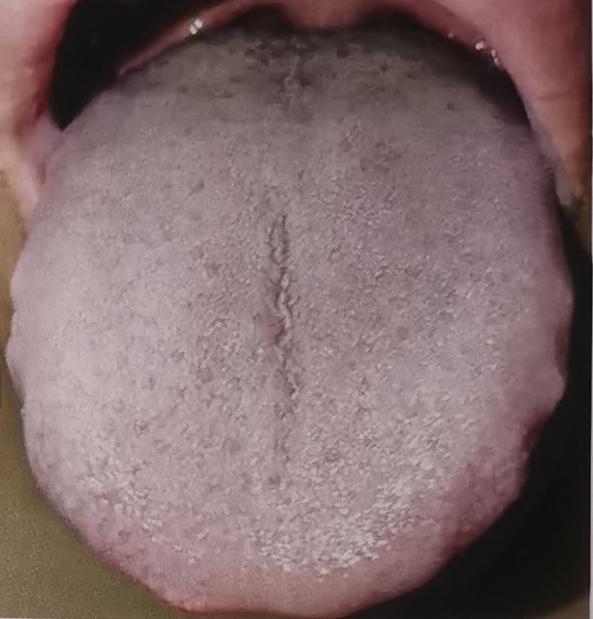
(Image) Typical Symptoms of Teeth Marks, Fatty, Pale Tongue with White Coating
Other Symptoms Associated with This Tongue Sign
Patients with this tongue presentation may exhibit the following symptoms:
- Indigestion and Poor Appetite: This is due to Spleen Qi deficiency, which impairs the digestion and absorption of food.
- Incomplete Digestion (Food Stagnation): Food fails to be properly digested, causing bloating, discomfort, and poor absorption of nutrients.
- Abdominal Bloating and Diarrhea: Poor digestion leads to fluid retention and dampness, causing bloating, diarrhea, and digestive dysfunction.
- Fatigue and Weakness: Insufficient Qi and Blood can lead to physical weakness, mental fatigue, and lack of vitality.
- Loose Stools and Frequent Urination: Due to Spleen and Stomach weakness, the body fails to properly process fluids, leading to loose stools and frequent urination.
How to Adjust?
The root cause of this tongue presentation is Spleen and Stomach weakness, specifically Spleen Qi deficiency. Treatment should focus on tonifying the Spleen, improving digestion, resolving dampness, and strengthening the Qi to restore digestive function and overall vitality.
6.1. Daily Care: Dietary Adjustments
- Warm Foods: For those with Spleen and Stomach weakness, it is beneficial to consume warm foods such as yam, lotus seeds, sweet potatoes, shiitake mushrooms, coix seeds (Job’s tears), dates, chestnuts, broad beans, and beef. These foods help warm the Spleen and improve digestion and absorption.
- Avoid Cold Foods: Cold and damp-producing foods like watermelon, pears, grapefruit, and winter melon should be avoided, as they weaken the Spleen, worsen damp accumulation, and impede digestion.
Warm Foods Help Tonify the Spleen and Stomach
6.2. Herbal Formulas: Tonify the Spleen and Stomach
For patients with Spleen and Stomach weakness, the following herbs and formulas are commonly used:
- Ren Shen (人参), Bai Zhu (白术), Fu Ling (茯苓), Gan Cao (甘草), Shan Yao (山药), Jie Geng (桔梗), Bai Bian Dou (白扁豆), Lotus Seeds (莲子), Sha Ren (砂仁), Yi Yi Ren (薏苡仁), Chen Pi (陈皮), Da Zao (大枣), and Gan Jiang (干姜). These herbs help tonify the Spleen, improve digestion, eliminate dampness, and support Qi circulation.
- Shen Ling Bai Zhu San (参苓白术散) and Jian Pi Wan (健脾丸) are well-known formulas that support the Spleen and Stomach, improving digestive function and addressing Qi deficiency and damp accumulation.
Herbal Formulas to Tonify the Spleen and Stomach
6.3. Acupuncture Therapy: Tonify the Spleen and Stomach, Strengthen Qi
For patients with Spleen and Stomach weakness, the following acupoints are commonly used:
- Spleen Shu (脾俞), Stomach Shu (胃俞), Zhong Wan (中脘), Tian Shu (天枢), Guan Yuan (关元), Zu San Li (足三里), and San Yin Jiao (三阴交). These points help strengthen the Spleen, improve Qi circulation, and enhance digestive function.
- Moxibustion and Massage: Use moxibustion or gentle acupressure at these acupoints, especially at Spleen Shu and Stomach Shu, to enhance Qi flow and digestive function.
Moxibustion on Spleen Shu Point to Tonify the Spleen and Stomach
By applying these dietary and therapeutic approaches, patients with teeth marks, fatty, pale tongue with white coating can restore Spleen and Stomach Qi, resolve dampness, improve digestion, and enhance overall vitality and energy.
7. Pale, Thin Tongue with White Coating — TCM Diagnosis and Treatment for Lung and Kidney Qi Deficiency
A pale, thin tongue with white coating is a common tongue presentation in Traditional Chinese Medicine (TCM), often indicating Lung and Kidney Qi deficiency, which leads to imbalanced respiratory and renal functions, resulting in symptoms like Qi deficiency and Yin deficiency.
Tongue Diagnosis Analysis: Pale, Thin Tongue with White Coating
- Pale, Thin Tongue: Indicates Qi and Blood deficiency, particularly in the Lung and Kidney. The weak function of these organs fails to nourish the body, leading to insufficient Qi and Blood.
- White Coating: Suggests the presence of excess dampness or mild cold, which the weakened Lung and Kidney are unable to process effectively.
- Slight Teeth Marks on the Edge: Mild Spleen weakness often accompanies Lung and Kidney Qi deficiency, leading to poor fluid metabolism, which results in damp accumulation. This manifests as slight teeth marks on the tongue’s edge.
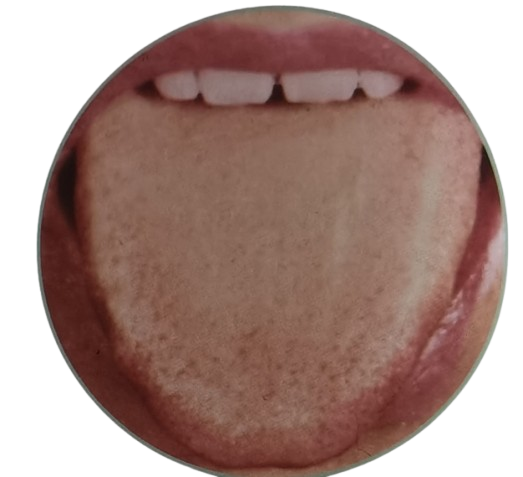
(Image) Typical Symptoms of Pale, Thin Tongue with White Coating
Other Symptoms Associated with This Tongue Sign
Patients with Lung and Kidney Qi deficiency often present with the following symptoms:
- Dry, Non-Productive Cough: A dry cough, often without phlegm, or with minimal clear, thin phlegm, due to lack of moisture in the Lung.
- Shortness of Breath and Wheezing: Difficulty breathing or wheezing, caused by insufficient Lung Qi and Kidney Qi, leading to inadequate respiratory function.
- Pale Complexion: A pale face, lacking the normal rosy glow, indicating Qi and Blood deficiency.
- Weak Voice: Qi deficiency leads to a soft, low voice or difficulty speaking due to insufficient breath.
- Cold Sensitivity: Feeling cold, especially in the lower back or limbs, is common in Kidney Qi deficiency.
- Heaviness in the Legs: A sensation of fatigue or weakness, particularly in the legs, often worsened by activity.
How to Adjust?
For Lung and Kidney Qi deficiency, the treatment approach focuses on tonifying Kidney Qi, nourishing Lung Yin, and improving respiratory function. This will help strengthen Qi and Blood, reduce symptoms of shortness of breath, dry cough, and fatigue, and improve overall vitality.
7.1. Daily Care: Dietary Adjustments
- Avoid Cool or Cold Foods: Patients with Kidney deficiency and dryness should avoid cold foods like winter melon, bitter melon, and ice cream, as these can harm the Spleen and Lung, aggravating Qi deficiency.
- Warmth and Protection: It’s important to keep the body warm, especially the lower back and limbs, to prevent cold from damaging the Kidneys and Lungs.
- Diet and Emotional Balance: Maintaining a regular, balanced diet and managing stress are important. Adequate rest and gentle, aerobic exercise can help improve circulation and energy.
Pear Soup for Lung Moistening and Cough Relief, Hydrates and Nourishes
7.2. Food Therapy: Tonify Qi and Nourish the Lungs
- Dang Shen and Huang Qi Porridge: Use Dang Shen (党参), Huang Qi (黄芪), and 60g of rice to make a porridge. This combination tonifies Qi and strengthens immunity, improving overall energy and lung function.
Dang Shen and Huang Qi Porridge for Boosting Qi and Immunity
7.3. Herbal Formulas: Nourish Kidney Yin and Clear Heat from the Lungs
For Lung and Kidney Qi deficiency, the following herbal formulas are beneficial:
- Shu Di Huang (熟地黄), Shan Zhu Yu (山茱萸), Shan Yao (山药), Fu Ling (茯苓), Ze Xie (泽泻), Mu Dan Pi (牡丹皮), Ren Shen (人参), Ge Jie (蛤蚧), Bai Zhu (白术), and Wu Wei Zi (五味子). These herbs help nourish Kidney Yin, clear Lung heat, moisturize dryness, and stop coughing.
- Liu Wei Di Huang Wan (六味地黄丸) and Shen Ge Wan (参蛤丸) are commonly used formulas for replenishing Kidney Yin, clearing Lung heat, and promoting respiratory function.
Liu Wei Di Huang Wan for Nourishing Kidney Yin and Enhancing Vitality
7.4. Acupuncture Therapy: Tonify Qi, Nourish the Lungs, and Enhance Kidney Function
For patients with Lung and Kidney Qi deficiency, acupuncture and moxibustion can be effective in improving lung function and Kidney Qi:
- Acupoints: Shen Shu (肾俞), Tai Xi (太溪), Fei Shu (肺俞), Tai Yuan (太渊), Gao Huang (膏肓), Zu San Li (足三里), Shan Zhong (膻中), and Feng Long (丰隆). These points help tonify Qi, nourish the lungs, and strengthen Kidney Qi.
- Moxibustion and Massage: Moxibustion and acupressure on Tai Xi (Kidney Shu) and Fei Shu (Lung Shu) can significantly improve Qi flow, enhance respiratory function, and help treat shortness of breath and fatigue.
Moxibustion on Tai Xi for Kidney Qi and Lung Nourishment
By integrating dietary adjustments, herbal treatments, and acupuncture therapy, patients with Lung and Kidney Qi deficiency can restore Qi, moisturize the Lungs, and improve overall respiratory function, helping them regain energy, vitality, and improved health.
Here’s the translation in American English:
8. Dark Red Tongue with Yellow, Greasy Coating – Analysis and Treatment of Phlegm Dampness and Blood Stagnation
Tongue Diagnosis: Dark Red Tongue, Yellow Greasy Coating
This tongue presentation is characterized by: a dark red tongue body, yellow and greasy coating on the middle and rear part of the tongue, and tooth marks on the sides. A dark red tongue indicates stagnation of Qi and blood, while the yellow and greasy coating shows the presence of heavy dampness and heat in the body, often accumulating in the lower abdomen. The yellow greasy coating and tooth marks indicate an accumulation of dampness, possibly with the transformation of heat.
- Dark Red Tongue: Suggests stagnation of Qi and blood, with insufficient vital energy, which easily leads to internal heat and dampness buildup.
- Yellow Greasy Coating: The combination of dampness and heat, presenting as phlegm dampness obstructing the normal circulation of Qi and blood.
- Tooth Marks: Weakness of the spleen and stomach, causing dampness to be unable to be expelled, resulting in water and moisture retention in the body.
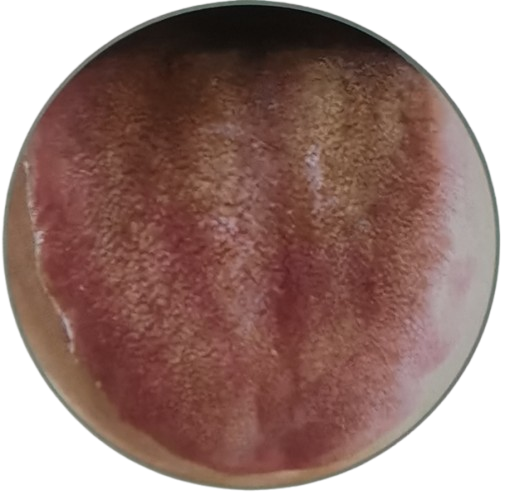
(Images) Typical symptoms of a Dark Red Tongue with Yellow Greasy Coating
Other Pathological Tongue Symptoms: For patients with phlegm dampness and blood stagnation, the following symptoms are commonly observed:
- Cough with phlegm, typically yellow and sticky or difficult to expectorate.
- Palpitations, caused by Qi stagnation and blood stasis, limiting heart function and possibly resulting in palpitations or shortness of breath.
- Chest or abdominal fullness and discomfort, with a heavy feeling in the chest or abdomen.
- Edema in the limbs, caused by the accumulation of dampness, potentially leading to general body swelling, especially in the lower limbs.
- Yellowish complexion, due to insufficient Qi and blood, and the retention of dampness in the body.
- Weakness in the waist and knees, and a bloated feeling in the lower abdomen, due to heavy dampness in the lower body, causing discomfort in these areas.
How to Treat: When treating phlegm dampness and blood stagnation, the primary approach is to strengthen the spleen, eliminate dampness, move Qi, and promote blood circulation to help clear dampness from the body, unblock Qi and blood flow.
8.1. Daily Care: Dietary Adjustments
- Add Vitamin A and Beta-Carotene: Foods such as animal liver, cod liver oil, dairy products, eggs, and fish roe help clear heat and detoxify, nourishing the lungs, and aiding in the expulsion of dampness.
- Eat Fresh Fruits and Vegetables: These help eliminate dampness, increase the intake of Vitamin C and fiber, promote digestive function, and prevent dampness from accumulating in the body.
Cod liver oil, rich in Vitamin A, helps clear heat and detoxify
8.2. Herbal Formulas: Clear Heat, Eliminate Dampness, Move Qi, and Promote Blood Circulation For patients with phlegm dampness and blood stagnation, the following herbs are recommended:
- Dang Shen, Bai Zhu, Fu Ling, Chai Hu, and Dang Gui: These herbs strengthen the spleen, expel dampness, move Qi, and break up blood stasis.
- Huang Bai, Ku Shen, and Hu Zhang: These herbs clear heat and detoxify, and are often used for external washes to remove dampness and detoxify.
- Commonly used formulas include Si Miao Wan (clears heat and eliminates dampness), Shen Ling Bai Zhu Wan (strengthens the spleen and eliminates dampness), and Jia Wei Xiao Yao Wan (soothes the liver and relieves depression).
Herbs that clear heat and eliminate dampness
8.3. Acupoint Therapy: Move Qi, Break Stasis, and Promote Circulation For patients with phlegm dampness and blood stagnation, the following acupoints can help regulate Qi and blood circulation:
- Qi Hai, Guan Yuan, Zi Gong, Zu San Li, Qi Men, and Tai Chong: Using reinforcement or Qi-moving techniques through acupressure and moxibustion, these points help promote the circulation of Qi and blood, break up stasis, and expel dampness and heat.
Massaging the Qi Hai acupoint helps move Qi, eliminate dampness, and regulate the flow of Qi and blood
8.4. Exercise: Strengthen the Body and Unblock Qi and Blood Circulation Regular physical activity helps expel dampness from the body, enhances metabolic function, and prevents stagnation. Suitable exercise options include:
- Walking, jogging, playing sports, or martial arts: These exercises help promote the flow of Qi and blood throughout the body, aiding in the elimination of internal dampness.
- Maintain a regular sleep schedule and healthy lifestyle habits, avoid staying up late and excessive fatigue, and promote better circulation of Qi and blood within the body.
Exercise helps improve circulation and eliminate dampness from the body.
9. Thin Tongue, Thin Greasy Coating – Tongue Diagnosis and Treatment for Liver and Kidney Deficiency
Tongue Diagnosis: Thin Tongue, Thin Greasy Coating
This tongue appearance is characterized by: a thin and small tongue body, thin and greasy coating, and relatively abundant saliva on the tongue surface. A thin tongue suggests Qi and blood deficiency, with weakened liver, spleen, and kidney functions; the thin greasy coating indicates the accumulation of dampness in the body. Dampness accumulation can obstruct the flow of Qi and blood, and it also reflects liver and kidney insufficiency.
- Thin tongue body: Indicates insufficient Qi and blood, with weakened liver, spleen, and kidney functions, leading to physical weakness.
- Thin greasy coating: Dampness retention, with impaired Qi and blood circulation, causing an inability to expel dampness, which affects spleen and stomach functions.
- Abundant saliva on the tongue surface: Indicates that dampness has accumulated in the body and has not been effectively metabolized.

(Images) Thin tongue, thin greasy coating – typical symptoms
Other Symptoms of the Pathological Tongue Appearance
Patients with liver and kidney deficiency often exhibit the following symptoms:
- Pale complexion: Insufficient Qi and blood, resulting in a pale or dull complexion with a lack of luster.
- Sore shoulders, back, and limbs: Liver and kidney insufficiency leads to weak tendons and bones, causing pain and soreness in the muscles and joints.
- Lack of appetite: Weak spleen and stomach function, leading to poor digestion and a diminished appetite.
- Dizziness and head heaviness: Liver blood deficiency, causing dizziness and lightheadedness.
- Osteoporosis: Liver and kidney deficiency causes the loss of bone density, leading to fragile and painful bones.
- Weak limbs: Qi and blood deficiency causes weakness and fatigue in the limbs, reducing physical strength and mobility.
How to Treat?
For this tongue appearance of liver and kidney deficiency, the treatment should focus on replenishing Qi and blood, nourishing the liver and kidneys, and expelling dampness. This will help restore the functions of the liver and kidneys and enhance the body’s supply of Qi and blood.
9.1, Daily Care: Dietary Adjustment
- Foods to Nourish the Liver and Kidneys: Foods such as Goji berries (枸杞子), Black fungus (木耳), Lotus seeds (莲子), Chinese yam (山药), and Taro (芋头) are beneficial for nourishing the liver and kidneys and boosting Qi and blood.
- Avoid spicy, greasy, or stimulating foods: Such as chili peppers, hot pot, and fried chicken, as these foods can exacerbate internal dampness, harming liver and kidney function.
- Moderate exercise: Physical activity can strengthen the body, improve Qi and blood circulation, but excessive exertion and muscle strain should be avoided.
Black fungus helps nourish Qi and blood.
9.2, Herbal Formulas: Tonify Qi and Blood, Nourish the Liver and Kidneys
For patients with liver and kidney deficiency, the following herbal formulas are commonly used:
- Atractylodes (白术), Astragalus (黄芪), Poria (茯苓), Cinnamon twig (桂枝), Achyranthes (牛膝), and Goji berries (枸杞子) can help strengthen the spleen, benefit the kidneys, and nourish the liver and blood.
- Commonly used ready-made formulas include Gui Pi Tang (归脾汤) (tonifies Qi and blood, strengthens the spleen, and nourishes the heart) and Jian Pi Yi Shen Granules (健脾益肾颗粒), which can be adjusted based on symptoms.
Gui Pi Tang helps tonify Qi and blood, strengthen the spleen, and nourish the heart.
9.3, Acupuncture Therapy: Tonify Qi and Blood, Nourish the Liver and Kidneys
By massaging and applying moxibustion on the following acupuncture points, you can help treat liver and kidney deficiency and Qi and blood insufficiency:
- Da Zhui (大椎), Jian Jing (肩井), Zu San Li (足三里), He Gu (合谷), Tai Chong (太冲), Gan Shu (肝俞), Pi Shu (脾俞), Wai Guan (外关), Feng Long (丰隆), Shen Shu (肾俞). Massaging or applying moxibustion to these points can regulate Qi and blood, nourish the liver and kidneys, and promote the smooth flow of Qi and blood.
- Gua Sha (scraping) can be used on the shoulders and lower back to relieve pain and improve blood circulation.
Gua Sha on the shoulders can relieve soreness.
9.4, Moderate Exercise Therapy
In addition to dietary and herbal treatments, appropriate exercise is beneficial for enhancing physical health, particularly for the restoration of liver and kidney functions:
- Activities such as walking, yoga, and Tai Chi are gentle exercises that promote the circulation of Qi and blood, improve comfort, and enhance liver and kidney function.
Moderate exercise helps improve liver and kidney function and alleviate discomfort.
10. Dull Tongue, Yellow Greasy Coating – Tongue Diagnosis and Treatment for Spleen and Lung Deficiency
Tongue Diagnosis: Dull Tongue, Yellow Greasy Coating
This tongue appearance is characterized by: a dull tongue body, yellow and greasy coating, and indentations along the sides of the tongue. A dull tongue indicates Qi and blood deficiency, with weakened spleen and lung functions; the yellow and greasy coating signifies the stagnation of dampness, possibly accompanied by internal heat. The indentations on the sides typically suggest spleen deficiency, which is unable to expel dampness from the body, leading to stagnation.
- Dull tongue body: Indicates insufficient Qi and blood, with weakened spleen and lung functions, leading to a lack of nutritional support for the body.
- Yellow greasy coating: Stagnation of dampness, impaired spleen and stomach function, possibly accompanied by internal heat.
- Indentations (teeth marks): A typical sign of spleen deficiency, indicating poor transformation of fluids, which allows dampness to accumulate in the body.
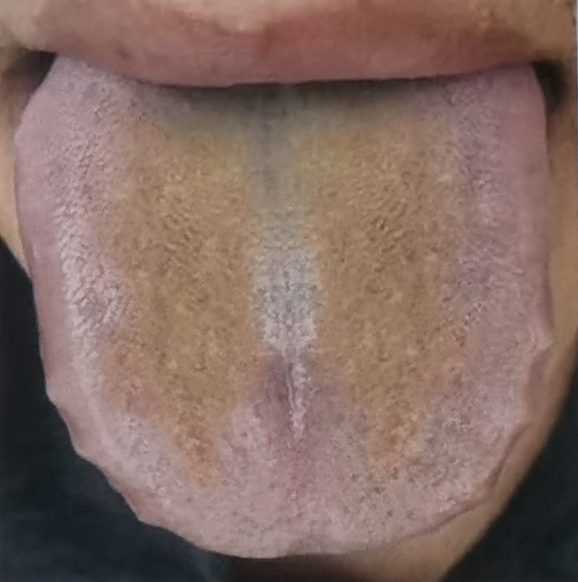
(Image) Dull tongue, yellow greasy coating – typical symptoms
Other Symptoms of the Pathological Tongue Appearance
Patients with spleen and lung Qi deficiency often exhibit the following symptoms:
- Pale complexion: Insufficient Qi and blood, resulting in a dull, yellowish or pale complexion.
- Cold hands and feet: Weakness in the spleen and lungs leads to insufficient yang energy in the body.
- Fatigue and poor appetite: Weakness in energy and digestion, causing reduced appetite and lack of vitality.
- Loose stools: Spleen deficiency leads to impaired water and fluid transformation, resulting in loose stools.
- Coughing, shortness of breath, and excess phlegm: Lung Qi deficiency impairs the ability to expel dampness and phlegm effectively from the body.
How to Treat?
This tongue appearance is primarily caused by spleen and lung Qi deficiency. Treatment should focus on strengthening the spleen and lungs, replenishing the body’s Qi and blood, and eliminating pathogenic factors to restore the function of these organs.
10.1, Daily Care: Diet and Lifestyle
- Dietary Adjustment: Consume foods rich in vitamins A and B, such as carrots, leafy green vegetables, milk, and whole grains. These foods help nourish the spleen and lungs, boosting Qi and blood.
- Avoid spicy, fried, or greasy foods: Such foods may exacerbate internal damp heat, affecting spleen and stomach function.
- Regular sleep schedule: Avoid staying up late and maintain a consistent sleep routine to promote the recovery of spleen and lung Qi and blood.
- Moderate exercise: Engage in physical activity to strengthen the body’s resistance to illness and improve the spleen and lung’s ability to transform and transport Qi and blood.
Carrots are rich in vitamins A and B.
10.2, Herbal Formulas: Strengthen the Spleen and Lungs, Strengthen the Body and Expel Pathogens
To treat spleen and lung Qi deficiency, the following herbal remedies are commonly used:
- Astragalus (黄芪), Licorice (甘草), Ginseng (人参), Poria (茯苓), Atractylodes (白术), Schisandra (五味子), Ophiopogon (麦冬), Dried ginger (干姜), Purple Aster (紫菀), and Coltsfoot (款冬花) can all help strengthen the spleen, benefit Qi, and nourish the lungs and Yin.
- Classic formulas include Shen Ling Bai Zhu San (参苓白术丸) and Bu Fei Wan (补肺丸), which help restore spleen and lung function.
Astragalus helps tonify Qi and blood, enhancing physical strength.
10.3, Acupuncture Therapy: Strengthen the Spleen and Lungs, Strengthen the Body and Expel Pathogens
By massaging and stimulating the following acupuncture points, you can effectively strengthen the spleen and lungs and expel pathogens:
- Yintang (印堂), Yingxiang (迎香), Chize (尺泽), Lieque (列缺), Fengmen (凤门), Pi Shu (脾俞), Fei Shu (肺俞), Baihui (百会), Hegu (合谷). Massaging these points helps regulate Qi and blood in the spleen and lungs, enhance immunity, and improve the stagnation of dampness in the body.
- Each point should be massaged for about 3 minutes, with moderate pressure, to relieve fatigue and promote the flow of Qi and blood.
Massaging Yintang, Yingxiang, and other points to regulate the spleen and lungs.
11. Pale Tongue, Thin White Greasy Coating – Tongue Diagnosis and Treatment for Qi and Blood Deficiency
Tongue Diagnosis: Pale Tongue, Thin White Greasy Coating
This tongue appearance is characterized by: a pale tongue body, thin white greasy coating, fine cracks on the tongue surface, and a slightly enlarged tongue. The analysis is as follows:
- Pale tongue body: Indicates insufficient Qi and blood, usually reflecting Qi deficiency or blood deficiency.
- Thin white greasy coating: Suggests the presence of internal cold dampness, with impaired spleen and stomach function.
- Cracks on the tongue surface: Typically indicates a deficiency of body fluids, meaning a lack of Yin fluids in the body.
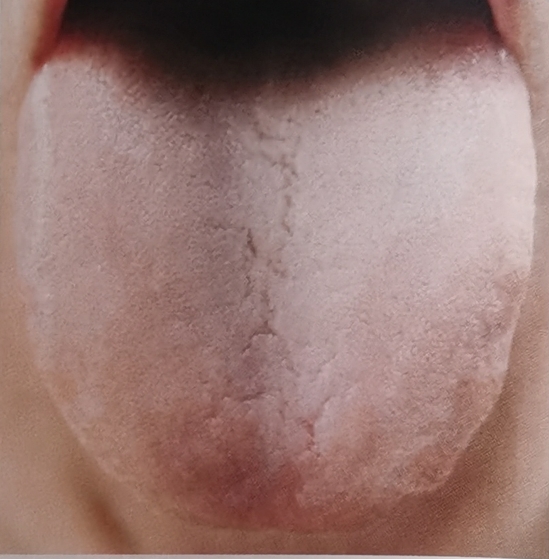
(Image) Pale tongue, thin white greasy coating – typical symptoms
Other Symptoms of the Pathological Tongue Appearance
Patients with Qi and blood deficiency often exhibit the following symptoms:
- Fatigue and weakness: Easily feeling tired and weak, as Qi and blood fail to nourish the whole body.
- Dry mouth with little thirst: The body lacks sufficient body fluids, resulting in thirst but little desire to drink.
- Lack of appetite: Weak stomach Qi leads to reduced appetite and poor digestion.
- Palpitations and shortness of breath: Qi and blood deficiency causes heart palpitations, shortness of breath, and difficulty concentrating.
- Pale complexion: Due to Qi and blood deficiency, the face lacks color and vitality.
- Restlessness and irritability: Due to poor Qi and blood circulation, emotional instability, anxiety, and irritability are common.
How to Treat?
This tongue appearance reflects Qi and blood deficiency, accompanied by internal dampness. The core treatment principles should focus on tonifying Qi, nourishing blood, strengthening the spleen, benefiting Qi, and clearing the stomach.
11.1, Daily Care: Diet and Lifestyle
- Foods that tonify Qi and nourish Yin: Eat foods like lotus seeds, coix seeds (Yi Yi Ren), tremella, and lily bulbs. These foods help tonify Qi, nourish blood, and moisten dryness.
- Avoid or reduce foods that deplete Qi and Yin: Foods like chili and fatty meats may aggravate dampness or cause internal dryness, further harming the body’s fluids.
- Moderate exercise: Engage in light activities like walking or tai chi to enhance Qi and blood circulation, while avoiding overexertion.
Coix seed porridge can tonify Qi and nourish Yin.
11.2, Herbal Formulas: Tonify Qi, Nourish Blood, Strengthen the Spleen
To address Qi and blood deficiency, the following herbs are commonly used:
- American ginseng (西洋参), Sour jujube seeds (酸枣仁), Astragalus (黄芪), and Lotus seeds (莲子) effectively tonify Qi, nourish blood, and enhance spleen and stomach function.
- Classic formulas such as Ba Zhen Tang and Ge Gen Tang can be combined to comprehensively regulate Qi and blood, enhancing physical strength.
Astragalus tea helps tonify Qi and nourish blood.
11.3, Acupuncture Therapy: Tonify Qi, Nourish Blood, Strengthen the Spleen
By massaging the following acupuncture points, you can effectively promote Qi and blood circulation and enhance spleen and stomach function:
- Qi Men (期门), Gan Shu (肝俞), Pi Shu (脾俞), Neiguan (内关), Shangwan (上脘), Zhongwan (中脘), Guanyuan (关元), Dan Zhong (膻中), San Yin Jiao (三阴交), Zu San Li (足三里), Feng Chi (风池), Da Zhui (大椎), and Qi Hai (气海). Massaging these points helps regulate Qi and blood, enhance the digestive system, and reduce internal dampness.
- Each point should be pressed for about 3 minutes, with moderate pressure, to regulate Qi and blood, and improve internal dampness.
Massaging Qi Men (期门) helps strengthen the spleen and tonify Qi.
12. Fat Tongue, Thin White Coating – Tongue Diagnosis and Treatment for Spleen Qi Deficiency
Tongue Diagnosis: Fat Tongue, Thin White Coating
This tongue appearance is characterized by: a fat and enlarged tongue body, pale tongue color, thin white coating, and tooth marks along the edges of the tongue. The analysis is as follows:
- Fat tongue body: Indicates that water and dampness have not been properly expelled, suggesting a weak Spleen Qi that is unable to transform and transport water and dampness.
- Tooth marks on the edges: Suggests Spleen deficiency with accumulated dampness. The tongue edges become swollen due to the stagnation of moisture, resulting in tooth marks.
- Pale tongue and thin white coating: Typically indicates that internal cold is present, with insufficient Yang Qi in the Spleen and Stomach.
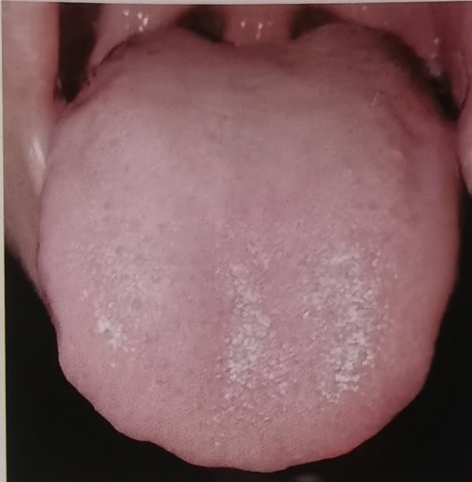
(Image) Fat tongue, thin white coating, and tooth marks along the edges – typical symptoms
Other Symptoms of the Pathological Tongue Appearance
Patients with Spleen Qi deficiency and damp accumulation often exhibit the following symptoms:
- Sensitivity to cold: Due to insufficient Spleen Yang, the body cannot warm itself, leading to a heightened sensitivity to cold.
- Loose stools or diarrhea: A weak Spleen Qi results in poor water and dampness transformation, leading to loose stools.
- Frequent clear urination: Dampness is not properly discharged, causing frequent and clear urination.
- Cold limbs: Insufficient Yang Qi leads to coldness in the extremities.
- Fatigue and sluggishness: Spleen deficiency causes insufficient Qi and blood, leading to tiredness and lack of energy.
- Low immunity: Weak Spleen Qi makes the body prone to catching colds and experiencing fatigue.
- Shortness of breath and reluctance to speak: Insufficient Spleen Qi leads to weakness, resulting in a lack of energy and reluctance to speak.
How to Treat?
The formation of a fat tongue is typically associated with weak Spleen Qi, which results in stagnation of water and dampness within the body. The core treatment principle should focus on strengthening the Spleen, tonifying Qi, and eliminating dampness and phlegm.
12.1, Daily Care: Diet and Exercise
- Foods to strengthen the Spleen, tonify Qi, and eliminate dampness: Foods like lotus seeds, coix seeds (Yi Yi Ren), Poria, dates, yam, white hyacinth bean, and loofah can help the Spleen and Stomach transform water and dampness.
- Moderate exercise: Activities like aerobics or yoga promote Qi and blood circulation, improving the function of the Spleen and Stomach.
- Avoid cold and damp environments: Maintain body temperature, avoid excessive fatigue, and protect the body from external cold and dampness.
Practicing yoga benefits both physical and mental health.
12.2, Herbal Formulas: Strengthen the Spleen, Tonify Qi, Eliminate Dampness and Phlegm
Choose different Chinese herbal formulas based on the individual’s condition:
- Ping Wei San: Strengthens the Spleen and dries dampness, suitable for situations with excessive dampness.
- Fu Zi Li Zhong Wan: Warms the Spleen and disperses cold, suitable for conditions where there is internal cold due to Spleen Yang deficiency.
Choose specific herbal formulas according to the condition.
12.3, Acupuncture Therapy: Eliminate Dampness, Strengthen the Spleen, Tonify Qi
By massaging specific acupuncture points, you can help eliminate dampness, resolve phlegm, and strengthen the Spleen and Qi:
- Feng Long (丰隆): This point is used to expel dampness, regulate the Spleen and Stomach, and promote Qi and blood circulation.
- Cheng Shan (承山): This point helps to clear dampness and relieve symptoms like leg edema.
Massage Methods: You can use cupping, gua sha, or direct acupressure to stimulate these points, helping the Spleen and Stomach transform water and dampness and improve internal dampness.
Massaging Feng Long (丰隆) helps eliminate dampness.
Summary
In Traditional Chinese Medicine (TCM), the tongue diagnosis of a fat tongue with thin white coating typically indicates Spleen Qi deficiency, with the accumulation of water and dampness in the body. This tongue appearance is commonly found in individuals with a Qi deficiency constitution. It not only reflects an imbalance in the Spleen and Stomach functions but is also associated with symptoms such as sensitivity to cold, loose stools, and fatigue.
The key to treating Spleen Qi deficiency is to strengthen the Spleen, tonify Qi, and eliminate dampness and phlegm, thereby improving the Qi-deficient constitution.
- Dietary considerations should focus on foods that tonify Qi and strengthen the Spleen, while moderate exercise helps enhance physical strength.
- Herbal formulas should be selected based on the individual’s condition, aiming to regulate and restore balance to the body.
- Acupuncture therapy, particularly massaging Feng Long (丰隆) and Cheng Shan (承山), can effectively assist in eliminating dampness and phlegm, promoting Qi and blood circulation.
By using these comprehensive methods, the symptoms of Spleen Qi deficiency can be gradually improved, boosting immunity and promoting overall health recovery.
More Articles in “Tongue Physique”
- Tongue Image Body Type
- Qi Deficiency Body Type
- Qi Stagnation Body Type
- Damp-Heat Body Type
- Phlegm Dampness Body Type
- Blood Stasis Body Type
- Yang Deficiency Body Type
- Yin Deficiency Body Type
Learn more about how to identify your tongue type in Identification Tongue section.
Subscribe now and enjoy 15% off your first purchase








